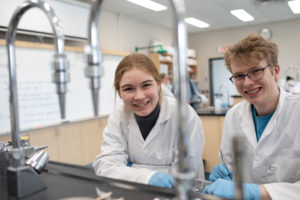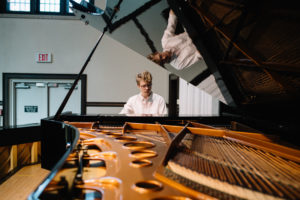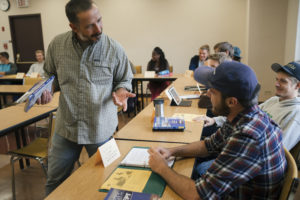University comes with many opportunities to try new things, meet new and different people, and explore unfamiliar areas of knowledge. But all these options can often be overwhelming and confusing. This is where student advising comes in, and of all the choices to be made at university, making an advising appointment is one of the best.
Every first-year student at CMU automatically gets an advising appointment with our Coordinator of Student Advising, Vern Kehler. This initial session helps students plan out their first year of classes and think about the degree programs they’re interested in. But student advising doesn’t stop there.

Students can attend near-weekly academic workshops, held by professors and staff, on topics like note-taking, essay writing, speed reading, and many other helpful skills. Personally, I’ve always learned something new at these events!
CMU also offers financial counselling, specific academic advice from faculty advisors, and career advising. I sat down with Adelia Neufeld Wiens, CMU’s on-campus career counsellor, to talk about her work with students.
Malcolm: With all the advising options at CMU, what’s the difference between academic advising and what you do?
Adelia: Sometimes in academic advising sessions, students get bogged down with course choices and degree audit forms, which takes up most of their time. But I get to give students an opportunity to step back and ask the questions, “Who do I want to be? What am I good at? What am I passionate about?” It’s a chance to talk openly about the big picture and reflect.
So, career advising means a lot of resume work, right?

Yes and no! From time to time, we’ll look at resumes. But lots of people can write good resumes, and lots of people can coach you on how to write a good resume. A resume can always be improved, but I’m really about asking, “Does your resume reflect who you are? And who are you outside of this piece of paper?” I’m a big believer in asking questions that help students get at that clarity of personality. When you think about these questions, it helps you practice your personal “elevator pitch.” And it’s fun!
What advice do you have for students about to go into university?
Sometimes the question of “What do you want to be when you grow up?” is really more of an obstacle. High school students have heard it their entire lives. People had an answer that came easiest in Grade 2, which became the expected answer in Grade 9, and by Grade 12 they don’t have any other ideas. But university ends up being a reality check — maybe that answer doesn’t match who you are anymore. For some people it crashes and burns, but that’s okay!
I often use the word “strategize.” And the strategizing starts now! Not just in what classes you’re taking, but also in what you’re learning about yourself as you take these classes. The earlier you start, the more deep and meaningful your degree will be for you.
So, you like to take a look at the big picture?

Career advising is self-examination, but it’s not just “Me, me, me” — but, “Me in the context of other people.” I also encourage students to ask, “Who am I in the face of economic disparity? Or climate change?” And CMU is such a good place to do that.
What do you enjoy about advising students?
I love meeting first-year students. I like learning about what high school was like for them, what their hopes and dreams were and are, and what they’ve learned about themselves after a semester at CMU. And what do they find themselves drawn to now? I love watching when the light comes on.
Thanks for taking the time to chat! Any final thoughts for students?
Career advising isn’t about leaving the meeting thinking, “I know I’m going to be an accountant.” Instead, I like to help students get a better idea of what’s important to them and what their strengths are. And then, you can start exploring some new things.
Malcolm Reimer is a 2nd year Science student.

